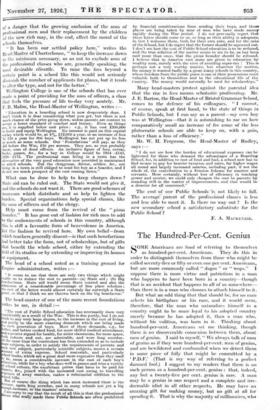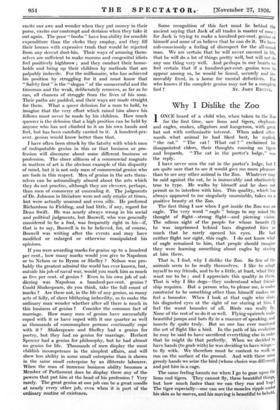The Hundred-Per-Cent. Genius
SOME Americans are fond of referring to themselves as hundred-per-cent. Americans. They do this in order to distinguish themselves from those who might be called seventy-five or fifty or even one per cent. Americans, but are more commonly called " dagos " or " wops." I suppose there is more virtue and patriotism in a man who happens to have been born in a country—though that is an accident that happens to all of us somewhere— than there is in a man who chooses to attach himself to it.
But what an odd thing that that should be, for no man selects his birthplace or his race, and it would seem, therefore, that the man who naturalizes himself in a country ought to be more loyal to his adopted country merely because he has adopted it, than a man who, without his volition, was born in it. Thinking about hundred-per-cent. Americans set me thinking, though there is no discoverable connexion between them, about men of genius. I said to myself, " We always talk of men of genius as if they were hundred-per-cent. men of genius, and are bewildered and confounded when we detect them in some piece of folly that might be committed by a P.D.F.' (That is my way of referring to a perfect damned fool.) I suggest to my readers that there is no such person as a hundred-per-cent. genius : that, indeed, any but a twenty-five per cent. genius is rare. A man may be a genius in one respect and a complete and irre- deemable idiot in all other respects: He may have an amazing gift for making money, but no gift at all for spending it. That is why the majority of millionaires, who excite our awe and wonder when they put money in their purse, excite our contempt and derision when they take it out again. The poor " boobs " have less ability for sensible expenditure than the clerks they employ, and they fill their houses with expensive trash that would be rejected from any decent dust-bin. Their ways of amusing them- selves are sufficient to make morons and congenital idiots feel positively highbrow ; and they conduct their house- holds and bring up their children by methods that are palpably imbecile. For the millionaire, who has achieved his position by struggling for it and must know that " Safety first " is the " slogan " of the unsuccessful and the timorous and the weak, deliberately removes, as far as he can, all chances of struggle from the lives of his sons. Their paths are padded, and their ways are made straight, for them: What a queer delusion for a man to hold, to imagine that the very effort which raised him above his fellows must never be made by his children. How much queerer is the delusion that a high position can be held by anyone who has not climbed to it on his own hands and feet, but has been carefully carried to it. A hundred-per- cent. genius would know better than that.
I have often been struck by the fatuity with which men of indisputable genius in this or that business or pro- fession will discourse about some different business or profession. The sheer silliness of a commercial magnate in matters of art is the obvious example of this disparity of mind, but it is not only men of commercial genius who are fools in this respect. Men of genius in the arts them-* selves can be astoundingly absurd about the arts which they do not practise,. although they are cleverer, perhaps, than men of commerce at concealing it. The judgments of Dr. Johnson in literature were not only erratic at times, but were actually unsound and even silly. He preferred Richardson to Fielding, and had little, if any, regard for Dean Swift. He was nearly always wrong in his social and political judgments, but Boswell, who was generally considered to be a fool, was frequently right in his—if, that is to say, Boswell is to be believed, for, of course, Boswell_ was writing after the events and may have modified or enlarged or otherwise manipulated his opinions.
If you were awarding marks for genius up to a hundred per cent., how many marks would you give to Napoleon or to Nelson or to Byron or Shelley ? Nelson was pro- bably the greatest admiral the world has ever known, but, outside his job of naval war, would you mark him as much as five per cent. of genius ? Even in his own job of sol- diering was Napoleon a hundred-per-cent. genius ? Could Shakespeare, do you think, take the full count of marks ? Are there not, in the life of any genius, so many acts of folly, of sheer blithering imbecility, as to make the ordinary man wonder whether after all there is much in this business of genius ? Consider the common fact of marriage. How many men of genius have successfully coped with it or have coped with it one quarter as well as thousands of commonplace persons continually cope with it ? Shakespeare and Shelley had a genius for poetry, but they had no genius for marriage. Herbert Spencer had a genius for philosophy, but he had almost no genius for life. Thousands of men display the most childish incompetence in the simplest affairs, and will show less ability in some small enterprise than is shown in the same small enterprise by an illiterate labourer. When the man of immense business ability becomes a Member of Parliament does he display there any of the powers that put him at the head of his profession ? Very rarely. The great genius at one job can be a great noodle at nearly- every other job, even when it is part of the ordinary routine of existence. - - Some recognition of this fact must lie behind the ancient saying that Jack of all trades is master of none : for Jack is trying to make a hundred-per-Cent. genius of himself and none of us believe that he can do it. We hare sub-consciously a feeling of disrespect for the all-round Man. We are certain that he will never succeed in life, that he will do a lot of things pretty well, but will not do any one thing very well. And perhaps in Our hearts we feel certain that if a hundred-per-cent. genius were to appear among us, he would be found, securely and im- movably fixed, in a home for mental defectives. For who knows if the complete genius may not be a complete



















































 Previous page
Previous page